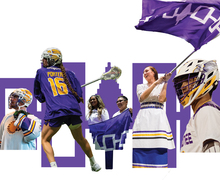Federal plan raises fears about privacy
The federal government has taken a cue from reality TV la ‘Big Brother’ by suggesting to follow each student through his or her college years.
A recent proposal suggesting the creation of a national database with detailed records of individual student enrollment, graduation and financial aid information, tracked by social security numbers in all universities and colleges, is raising concerns about the invasion of student privacy.
‘We’re simply doing a study to determine if this is something that would even be feasible to collect individual student enrollment and financial aid information,’ said Susan Aspey, the director of public affairs for the U.S. Department of Education. ‘Such statistics would, for the first time, give policy-makers and consumers accurate and comprehensive information about higher education in this country.’
The statistics could also be used to help improve access to higher education by tracking the success rates of students and universities that receive federal money, Aspey said.
If the policy is implemented by Congress, it could be tested on 1,500 colleges as early as the 2006 to 2007 academic year, according to a report by the Chronicle of Higher Education. The system would be fully functional the following year if the tests have good results.
The proposal does not sit well with several education organizations, which have major concerns about the students’ right to privacy and the confidentiality of the database.
‘We believe it is an admirable goal, but we believe that student privacy and rights should not be sacrificed for better statistics,’ said Jasmine Harris, legislative director for the United States Student Association.
Currently, the Department of Education and the National Center for Education Statistics collect information such as graduation rates, tuition and enrollment statistics from universities in databases called Integrated Postsecondary Education Data System surveys. These surveys, called IPEDS, do not report on individual students in accordance with the Federal Educational Rights and Privacy Act.
‘There is some protection under FERPA that forbids colleges that receive federal funds from releasing information without permission from parents or adult students,’ Harris said. ‘It infringes on students’ privacy rights.’
The law would have to be adjusted if the new proposal became policy, Harris said.
Another concern some educational organizations are voicing is whether or not the databases can and will remain strictly confidential and available only to the NCES as promised by the Department of Education.
‘With 14 million Americans enrolled in college each year, this will grow into a huge national database in no time,’ said Sarah Flanagan, vice president for government relations at the National Association of Independent Colleges and Universities. ‘Once it exists, it is hard to imagine that politicians, researchers and law enforcement won’t want to use the data for purposes other than its intended research purposes.’
One example of the realization of this fear is the National Directory of New Hires, which registers people re-entering the work force, Harris said. Initially the directory was supposed to remain confidential, but is now used not only to measure labor statistics, but also to check up on parents who have not paid child support.
‘I can see the purpose of the study, but it’s scary, because what else are they going to track with our social security numbers? It starts with one thing and goes on and on and on,’ said Haviva Siegel, a graduate student in the School of Education.
Some states are already seeking to link everything from elementary, high school and college records to prison and housing records to post-secondary databases, Flanagan said.
While policy-makers now promise the databases will remain private, ‘Congress has the ability to amend current laws regarding NCES and its information and is making and changing law to use the database as it sees fit,’ Harris said.
Thirty-nine states already use some form of a student unit record, Aspey said. New York state collects information from public institutions only at this point, but this will change if the current proposal becomes law.
‘If (the government is) going to give us the money to go to school, I don’t really care if they know when I graduate. It’s not like it’s a conspiracy theory,’ said Dave Robinson, a junior political science and economics major.
Some organizations have suggested that the NCES track students without using their social security numbers to help maintain privacy, but, Harris said, it seems as if the most reliable way to accurately track individuals is with the social security number.
‘This (presidential) administration is all about information control. It makes you worried,’ Siegel said. ‘What else are they going to track?’
Published on November 30, 2004 at 12:00 pm





